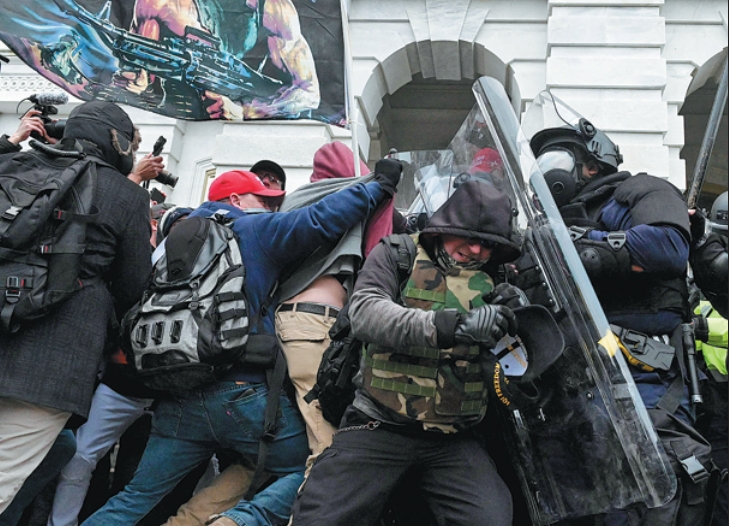Jan 6: One attack, two interpretations
Three years later, both Biden and Trump make Capitol riot a political rallying cry
Updated: 2024-01-06 08:04

WASHINGTON — In the United States, former president Donald Trump was expected to spend Saturday's third anniversary of the Capitol riot by holding two campaign rallies in leadoff-voting Iowa in his bid to win back the White House.
To mark the moment, incumbent President Joe Biden visited a site near Valley Forge, Pennsylvania, on Friday where George Washington and the struggling Continental Army endured a tough winter during the American Revolution. Biden's advisers said the stop in a critical swing state will highlight Trump's role in the Jan 6 siege and give the Democrat a chance for him to lay out the stakes of this year's election. Weather concerns led Biden to move up his appearance from Saturday.
With Biden and Trump now headed toward a potential 2020 rematch, both are talking about the same event in very different ways and offering framing they believe will give them an advantage. The dueling narratives reflect how an attack that disrupted the certification of the election is increasingly viewed differently along partisan lines — and how Trump has bet that the riot will not hurt his candidacy.
On Jan 6, 2021, Trump supporters stormed the Capitol in an attempt to stop Congress from certifying Biden's victory, and they forced lawmakers and then-vice-president Mike Pence to flee for their lives. Many Trump loyalists walked to the Capitol after a rally outside the White House in which the Republican president exhorted the crowd to "fight like hell" or "you're not going to have a country anymore".
Nine deaths were linked to the attack and more than 700 people have gone to court for their roles in it, and more than 450 people have been sentenced to prison.
Federal prosecutors in Washington have charged Trump in connection with the riot, citing his promotion of false and debunked theories of election fraud and efforts to overturn the results. Trump has pleaded not guilty and he has still built a commanding lead in the Republican primary. His rivals largely refrain from criticizing him about Jan 6.
Republican strategist Alice Stewart said "a lot of Republican voters don't love Jan 6, but they're not obsessed about it either" and may support Trump because they oppose Biden's economic policies.
"Republican voters can hold two consecutive thoughts and say, 'Jan 6, that wasn't great, but that doesn't affect my bottom line'," she said.
Hardened views
But views overall of the attack have hardened along partisan lines.
In the days after the attack, 52 percent of US adults said Trump bore a lot of responsibility for Jan 6, according to the Pew Research Center. By early 2022, that had declined to 43 percent. The number of people who said Trump bore no responsibility also increased to 32 percent in 2022 compared to 24 percent in 2021.
A Washington Post-University of Maryland poll released this week found that about 7 in 10 Republicans said too much is being made of the attack. Just 18 percent of GOP supporters said protesters who entered the Capitol were "mostly violent", down from 26 percent in 2021, while 77 percent of Democrats and 54 percent of independents said the protesters were mostly violent — essentially unchanged from 2021.
Meanwhile, a December poll from The Associated Press-NORC Center for Public Affairs Research found that 87 percent of Democrats and 54 percent of independents believe a second Trump term would negatively affect US democracy. Nearly 82 percent of Republicans believe democracy would be weakened by another Biden win, with 56 percent of independents agreeing.
Biden's campaign also announced an advertising push starting on Saturday with a spot centering on the Capitol attack.
His campaign is spending $500,000 to run the 60-second ad on national television news and on local evening news in TV markets, as well as shorter versions on digital platforms.
It is a theme that Biden has returned to repeatedly.
He marked the first anniversary of the riot in 2022 by standing inside the Capitol's National Statuary Hall — which was flooded by pro-Trump rioters during the attack — to suggest that his predecessor and his supporters had "a dagger at the throat of America".
Ahead of the 2022 midterm elections, the president said the "extreme ideology" of Trump and his supporters "threatens the very foundation of our republic".
On the second anniversary of the attack last year, Biden awarded presidential medals to 14 people for their work protecting the Capitol during the attack. More recently, he said there was "no question" Trump supported an insurrection.
Sign of 'deconsolidating'
Trump now counters that the federal charges he is facing related to Jan 6 — as well as authorities in Maine and Colorado trying to keep him off primary ballots on grounds that he incited an insurrection — show that Democrats are the ones looking to undercut the nation's core values.
"Joe Biden and his allies are a real and compelling threat to our democracy," Trump senior campaign advisers Chris LaCivita and Susie Wiles wrote in a memo this week.
Aside from the back and forth of politics, such arguments over who endangers the US more could indicate a deeper problem.
"When each side starts talking about the other as a threat to democracy — whatever the reality is — that's a sign of a democracy that's deconsolidating," Daniel Ziblatt, a government professor at Harvard University and co-author of the book How Democracies Die, said.
XINHUA
























